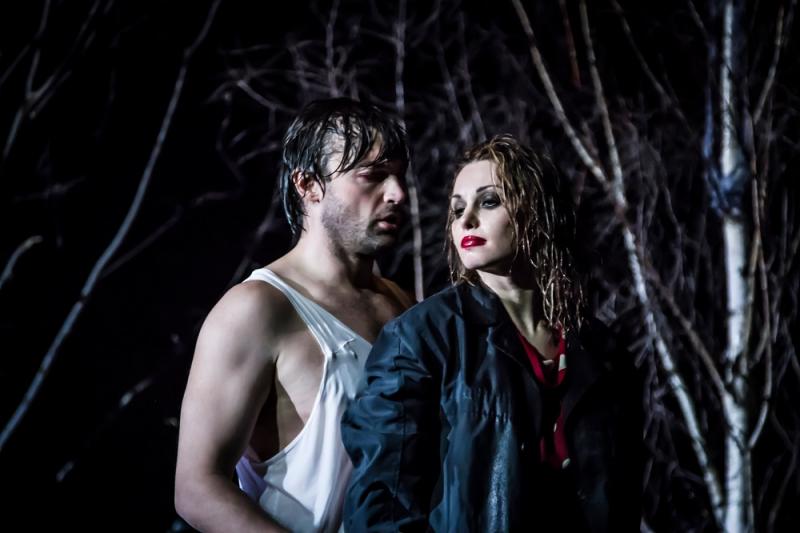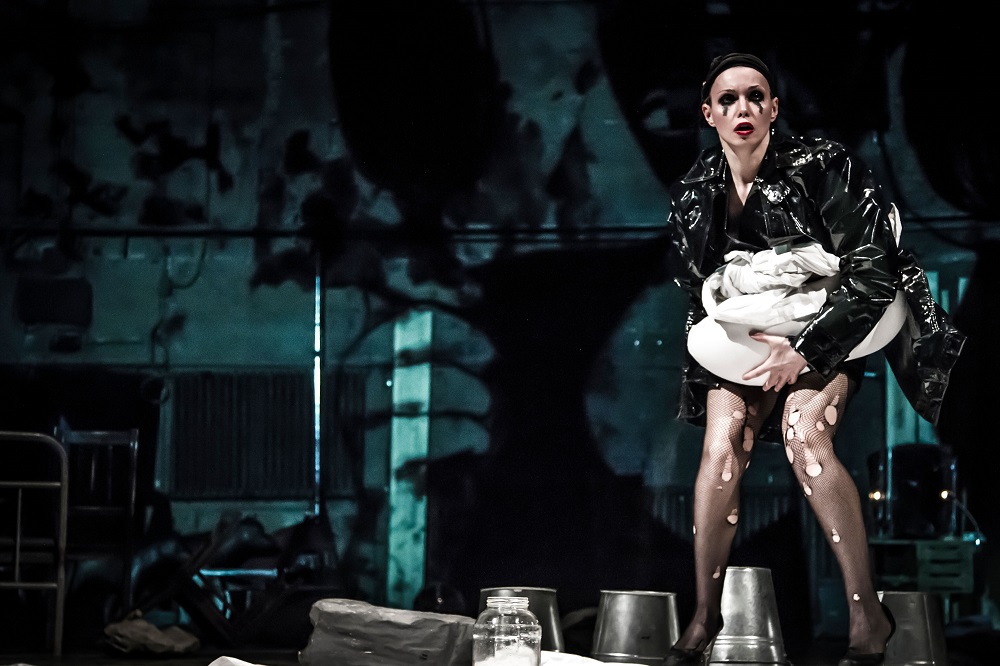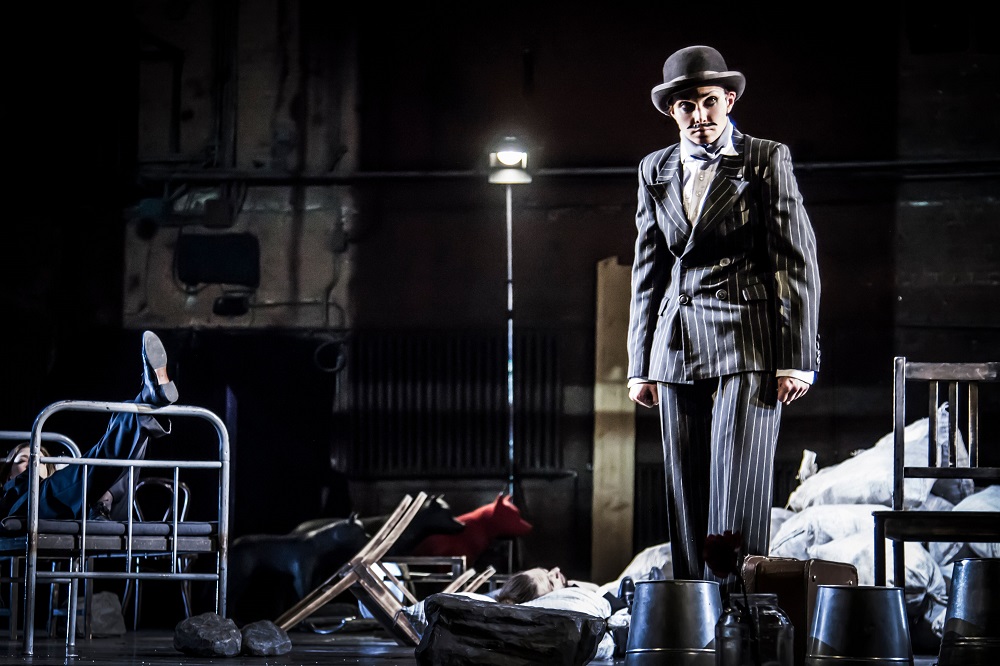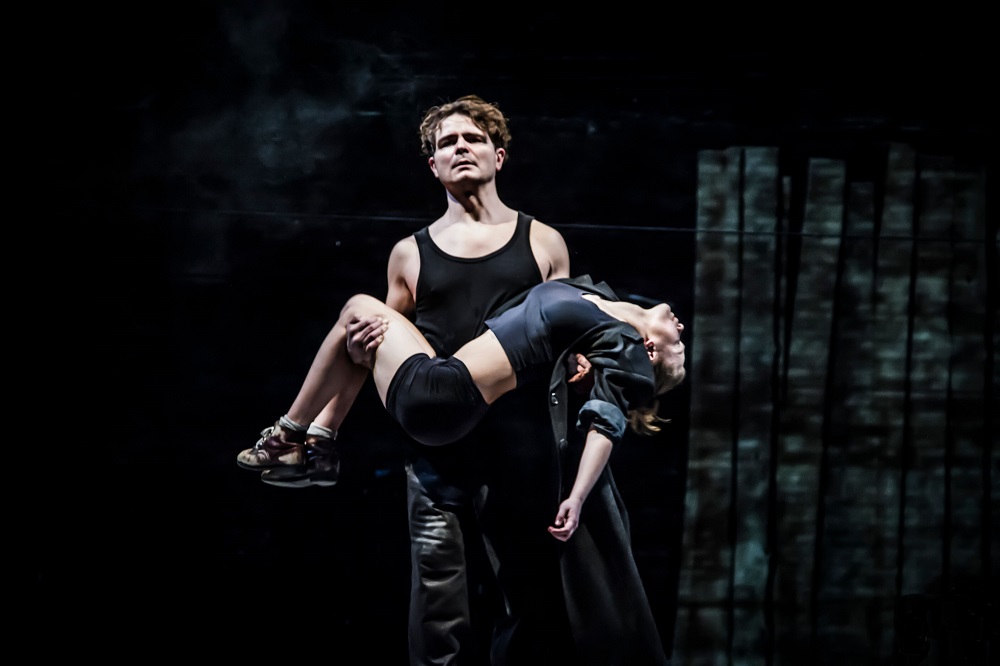The Good Person of Szechwan, Pushkin Drama Theatre, Barbican review - slick Russian Brecht | reviews, news & interviews
The Good Person of Szechwan, Pushkin Drama Theatre, Barbican review - slick Russian Brecht
The Good Person of Szechwan, Pushkin Drama Theatre, Barbican review - slick Russian Brecht
Musically strong, if persistent, this production has a star protagonist

"In our country the capable man needs luck," belts out Shen Te, the Good Person of Szechwan in the most powerful song of Brecht's epic "parable play" of 1941.
No doubt about it, though: the central and infinitely various performance of Alexandra Ursulyak (pictured below as Shen Te) pulls into compelling focus Brecht's other pertinent theme, that women are sold and men are the sellers, an inescapable fact that Shen Te puts to remarkable use by creating the role of a hard-nosed male cousin, Shui Ta. Three times "he" comes to the rescue, chipping away a little bit more of the goodness within. It's a theme Brecht also pursued with Kurt Weill in the shape of sisters Anna I and Anna II in their "sung ballet" The Seven Deadly Sins of the Petit Bourgeoisie. But The Good Person of Szechwan is oh-so-much longer.  The Pushkin team throws everything at it, sometimes at the expense of narrative clarity; and I wonder if anyone else was uncomfortable with how the slowly emerging truth that water-seller Wang, who opens the show, is also one of the gods – here two, not three, with the second one silent until the end – demands that actor Alexander Matrosov slip from "normal" into a characterisation of a poor man with what I took to be cerebral palsy. Ursulyak’s first appearance is a bit of a trial, too. I can understand that director Yury Butusov wants to kick against the grain of the sweet “tart with a heart”, and this Shen Te looks appropriately down at everything but heel; but that very Russian brand of shoutiness and a lot of clattering about outstay their welcome.
The Pushkin team throws everything at it, sometimes at the expense of narrative clarity; and I wonder if anyone else was uncomfortable with how the slowly emerging truth that water-seller Wang, who opens the show, is also one of the gods – here two, not three, with the second one silent until the end – demands that actor Alexander Matrosov slip from "normal" into a characterisation of a poor man with what I took to be cerebral palsy. Ursulyak’s first appearance is a bit of a trial, too. I can understand that director Yury Butusov wants to kick against the grain of the sweet “tart with a heart”, and this Shen Te looks appropriately down at everything but heel; but that very Russian brand of shoutiness and a lot of clattering about outstay their welcome.
Ursulyak’s cousin-impersonation is strong (pictured below), but it’s from the point at which Shen Te falls for a suicidal airman in a rain-drenched park that our attention is riveted. Her rendition of the central “Song of the Defencelessness of the Good and the Gods” is stunning proof that Ursulyak could hold an evening of Brecht/Weill and Brecht/Eisler. The original composer, Paul Dessau, is used here, and all his songs, performed in the original German, are powerful – above all the magnificient group delivery of “The Song of the Eighth Elephant” – or haunting, especially in the arrangements for a tireless four-piece band at the side of the stage; these musicians should be credited in the programme.  Musical director Igor Gorsky is called upon to do much more, though: essentially to fill the spoken dialogue with eclectic numbers that are more than background – something closer to the "semi-opera" Weill was planning to make of the "play with songs" at the end of his life. The jazz number during which the parasites pile in to the tobacco shop Shen Te has opened with her god-given thousand silver dollars is brilliantly executed – this ensemble can certainly dance – though the presentation can distract from the sense.
Musical director Igor Gorsky is called upon to do much more, though: essentially to fill the spoken dialogue with eclectic numbers that are more than background – something closer to the "semi-opera" Weill was planning to make of the "play with songs" at the end of his life. The jazz number during which the parasites pile in to the tobacco shop Shen Te has opened with her god-given thousand silver dollars is brilliantly executed – this ensemble can certainly dance – though the presentation can distract from the sense.
Likewise the scene with the two prostitutes jealous of Shen Te’s presumed poaching, played out revue-style by two stylish women at mikes in front of a drop-curtain with Diane Arbus’s famous photo of identical twins looming large. The projections on the back wall, information overload, can't often be made out. There are times when you wish the music would just disappear, either because it’s too sentimental or because silence in the more inward moments would be much more powerful.  Still, all the actors deliver well, especially Matrosov (pictured above with flagging "god" Anastasia Lebedeva), Alexander Arsentiev, a powerful presence as the fickle would-be airman, and the contralto-voiced Vera Voronkova as his opportunistic mother. The denouement is strong until Ursulyak has to shout against the music, first in German and then in Russian, in her climactic speech. Again, one feels some of the topicality to the way we live now is lost in an ingenious circus act. But credit to the company for giving us so much of the text as well as the original music for the songs; there aren’t many companies in the UK prepared to give Brecht something of his full measure in the longer plays today.
Still, all the actors deliver well, especially Matrosov (pictured above with flagging "god" Anastasia Lebedeva), Alexander Arsentiev, a powerful presence as the fickle would-be airman, and the contralto-voiced Vera Voronkova as his opportunistic mother. The denouement is strong until Ursulyak has to shout against the music, first in German and then in Russian, in her climactic speech. Again, one feels some of the topicality to the way we live now is lost in an ingenious circus act. But credit to the company for giving us so much of the text as well as the original music for the songs; there aren’t many companies in the UK prepared to give Brecht something of his full measure in the longer plays today.
The future of Arts Journalism
You can stop theartsdesk.com closing!
We urgently need financing to survive. Our fundraising drive has thus far raised £49,000 but we need to reach £100,000 or we will be forced to close. Please contribute here: https://gofund.me/c3f6033d
And if you can forward this information to anyone who might assist, we’d be grateful.

Subscribe to theartsdesk.com
Thank you for continuing to read our work on theartsdesk.com. For unlimited access to every article in its entirety, including our archive of more than 15,000 pieces, we're asking for £5 per month or £40 per year. We feel it's a very good deal, and hope you do too.
To take a subscription now simply click here.
And if you're looking for that extra gift for a friend or family member, why not treat them to a theartsdesk.com gift subscription?
more Theatre
 Ragdoll, Jermyn Street Theatre review - compelling and emotionally truthful
Katherine Moar returns with a Patty Hearst-inspired follow up to her debut hit 'Farm Hall'
Ragdoll, Jermyn Street Theatre review - compelling and emotionally truthful
Katherine Moar returns with a Patty Hearst-inspired follow up to her debut hit 'Farm Hall'
 Troilus and Cressida, Globe Theatre review - a 'problem play' with added problems
Raucous and carnivalesque, but also ugly and incomprehensible
Troilus and Cressida, Globe Theatre review - a 'problem play' with added problems
Raucous and carnivalesque, but also ugly and incomprehensible
 Clarkston, Trafalgar Theatre review - two lads on a road to nowhere
Netflix star, Joe Locke, is the selling point of a production that needs one
Clarkston, Trafalgar Theatre review - two lads on a road to nowhere
Netflix star, Joe Locke, is the selling point of a production that needs one
 Ghost Stories, Peacock Theatre review - spirited staging but short on scares
Impressive spectacle saves an ageing show in an unsuitable venue
Ghost Stories, Peacock Theatre review - spirited staging but short on scares
Impressive spectacle saves an ageing show in an unsuitable venue
 Hamlet, National Theatre review - turning tragedy to comedy is no joke
Hiran Abeyeskera’s childlike prince falls flat in a mixed production
Hamlet, National Theatre review - turning tragedy to comedy is no joke
Hiran Abeyeskera’s childlike prince falls flat in a mixed production
 Rohtko, Barbican review - postmodern meditation on fake and authentic art is less than the sum of its parts
Łukasz Twarkowski's production dazzles without illuminating
Rohtko, Barbican review - postmodern meditation on fake and authentic art is less than the sum of its parts
Łukasz Twarkowski's production dazzles without illuminating
 Lee, Park Theatre review - Lee Krasner looks back on her life as an artist
Informative and interesting, the play's format limits its potential
Lee, Park Theatre review - Lee Krasner looks back on her life as an artist
Informative and interesting, the play's format limits its potential
 Measure for Measure, RSC, Stratford review - 'problem play' has no problem with relevance
Shakespeare, in this adaptation, is at his most perceptive
Measure for Measure, RSC, Stratford review - 'problem play' has no problem with relevance
Shakespeare, in this adaptation, is at his most perceptive
 The Importance of Being Earnest, Noël Coward Theatre review - dazzling and delightful queer fest
West End transfer of National Theatre hit stars Stephen Fry and Olly Alexander
The Importance of Being Earnest, Noël Coward Theatre review - dazzling and delightful queer fest
West End transfer of National Theatre hit stars Stephen Fry and Olly Alexander
 Get Down Tonight, Charing Cross Theatre review - glitz and hits from the 70s
If you love the songs of KC and the Sunshine Band, Please Do Go!
Get Down Tonight, Charing Cross Theatre review - glitz and hits from the 70s
If you love the songs of KC and the Sunshine Band, Please Do Go!
 Punch, Apollo Theatre review - powerful play about the strength of redemption
James Graham's play transfixes the audience at every stage
Punch, Apollo Theatre review - powerful play about the strength of redemption
James Graham's play transfixes the audience at every stage
 The Billionaire Inside Your Head, Hampstead Theatre review - a map of a man with OCD
Will Lord's promising debut burdens a fine cast with too much dialogue
The Billionaire Inside Your Head, Hampstead Theatre review - a map of a man with OCD
Will Lord's promising debut burdens a fine cast with too much dialogue

Add comment